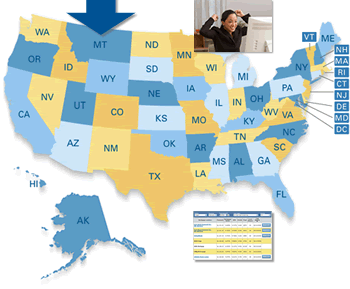Housing
Economics
Recovery in Housing Unsustainable without Jobs
by Nancy Osborne, COO of ERATE®
(01-25-10) A recovery in housing does not seem likely in 2010 without either a major turnaround in the jobs market or the continued pointless infusion of government support directed towards housing.
The sales numbers for December 2009 reflected a drop far worse than expected as sales tumbled almost 17% when only a 10% decline was predicted.
Too much appears to be continuing to go south for housing to mount any type of sustainable recovery on its own without more wasteful government support.
First and foremost housing faces a problem due to the lack of job growth coupled with an over-supply of inventory. Until the jobs picture improves, those whose job is uncertain should not consider purchasing a home.
First time home buyers, who were the target of the initial round of the government's housing tax credits, are frequently young and at the start of their careers.
Many may find it better to maintain some flexibility to be able to relocate for a job and yet they could find themselves in the position of not being able to sell their home in order to move onto a better situation.
Buying a home in an unstable economy should be seen as a risky proposition for all but those employed in the most recession-proof of industries, businesses and professions.
In fact a unique hallmark of this recession versus previous recessions has been the immobility many job seekers face due to the constraints of being unable to get out from under the obligation of their home.
This is not healthy for the larger economy which has been far too dependent on housing and housing debt as its engine of growth and now finds itself shackled by it.
The massive number of government programs implemented in support of housing may have been necessary to stem the immediate tide of a freeing falling and precipitous drop in home prices and yet the real back-bone of the housing market may not be found in housing tax-credits and artificially low interest rates brought about by government intervention but through the growth of jobs completely unrelated to the housing sector.
People with good jobs and incomes are in the best position to purchase a home, qualify for a loan modification or refinance their mortgage without posing an undue risk to the lender, the investor, their own credit rating or the taxpayers.
Let's hope the government recognizes it's time to shift the focus off direct intervention in the housing market and to begin focusing on getting the broader economy producing jobs which will result in an improved housing market as a consequence.
A healthy housing market should be the result of a strong economy not the engine of it. It's time for this cart before the horse philosophy of housing in Washington to come to an end.
 Nancy Osborne has had experience in the mortgage business for over 20 years and is a founder of both ERATE, where she is currently the COO and Progressive Capital Funding, where she served as President. She has held real estate licenses in several states and has received both the national Certified Mortgage Consultant and Certified Residential Mortgage Specialist designations. Ms. Osborne is also a primary contributing writer and content developer for ERATE.
Nancy Osborne has had experience in the mortgage business for over 20 years and is a founder of both ERATE, where she is currently the COO and Progressive Capital Funding, where she served as President. She has held real estate licenses in several states and has received both the national Certified Mortgage Consultant and Certified Residential Mortgage Specialist designations. Ms. Osborne is also a primary contributing writer and content developer for ERATE.
"I am addicted to Bloomberg TV" says Nancy.
Just One Click! = Current Mortgage Rate Chart

Start by selecting your state

